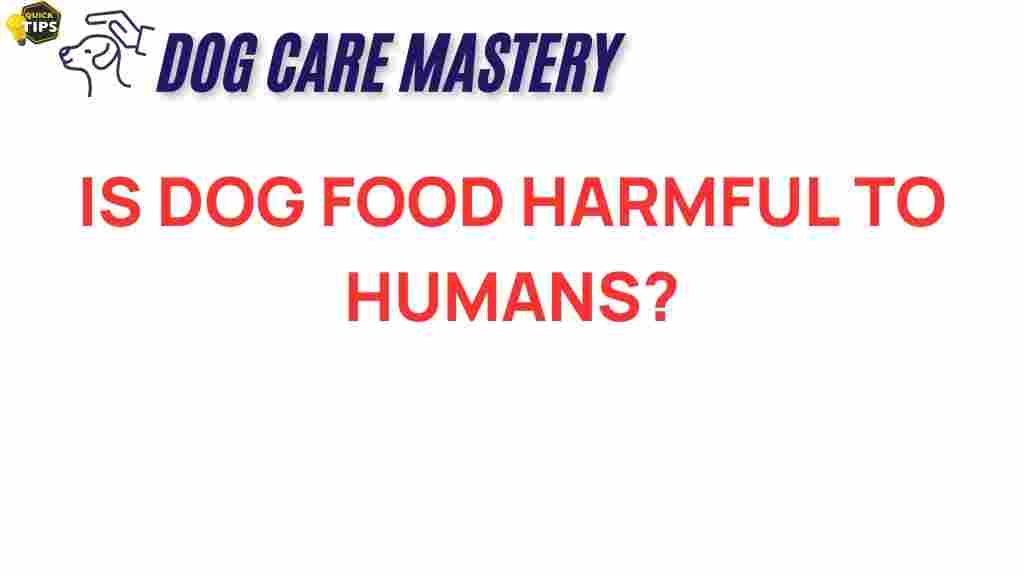Can Dog Food Be Dangerous for Humans?
When it comes to feeding our furry friends, dog food is a staple in many households. However, a curious question arises: can dog food be dangerous for humans? While the potential risks of consuming dog food may not be widely discussed, understanding the ingredients and safety protocols behind commercial pet food can shed light on this topic. In this article, we will explore the surprising truth about dog food, its ingredients, potential health risks, and what you should know before considering a taste test.
Understanding Dog Food Ingredients
Dog food is designed to meet the nutritional needs of dogs, which can differ significantly from those of humans. Here are some common ingredients found in dog food:
- Meat and Meat By-Products: Often the primary source of protein, these can include chicken, beef, or fish.
- Grains: Ingredients like corn, wheat, and rice are often used as fillers.
- Vegetables: Carrots, peas, and potatoes may be included for added nutrients.
- Additives: Preservatives and flavor enhancers are commonly used to improve shelf life and palatability.
While many of these components are safe for dogs, they may not always align with human dietary guidelines. Additionally, the quality of ingredients can vary widely among brands.
Potential Health Risks of Eating Dog Food
Although it may not be common, some individuals might consider trying dog food out of curiosity or an emergency situation. Here are several potential health risks associated with consuming dog food:
1. Nutritional Imbalance
Dog food is formulated to meet the nutritional needs of dogs, not humans. Key vitamins and minerals that are essential for humans might be lacking. For example:
- Dog food often lacks sufficient Vitamin C, which is crucial for human health.
- Humans require different levels of protein and fats compared to dogs.
2. Contaminants and Pathogens
Commercial dog food can be subject to contamination, just like human food. Potential contaminants include:
- Bacteria such as Salmonella and E. coli.
- Mold and mycotoxins that can develop during production.
Ingesting contaminated dog food can lead to foodborne illnesses in humans, which may manifest as gastrointestinal issues, fever, and more severe health problems.
3. Allergic Reactions
Some ingredients in dog food might trigger allergic reactions in humans. Common allergens include:
- Grains such as wheat or corn.
- Specific meat sources.
If you have known food allergies, consuming dog food could pose serious health risks.
4. Unregulated Additives
Dog food often contains additives and preservatives that are not necessarily safe for human consumption. Some of these can include:
- Artificial flavors and colors.
- Preservatives like BHA and BHT, which have been linked to health concerns.
While these ingredients might be safe for dogs, their effects on human health are not well-studied.
What Happens If You Accidentally Eat Dog Food?
If you accidentally consume dog food, it’s essential to monitor your health. Here’s a step-by-step process on what to do:
- Assess the Situation: Determine how much you consumed and what type of dog food it was.
- Check for Symptoms: Be aware of any gastrointestinal discomfort, allergic reactions, or other unusual symptoms.
- Consult a Medical Professional: If you begin to experience adverse effects, seek medical advice promptly.
- Stay Hydrated: Drink water to help flush out your system.
Troubleshooting Tips for Avoiding Dog Food Risks
To ensure your safety and avoid potential risks associated with dog food, consider these tips:
- Store Dog Food Properly: Keep dog food in a sealed container to prevent contamination.
- Read Labels: Always check the ingredient list for any allergens or harmful additives.
- Keep Dog Food Separate: Make sure to store dog food away from human food to avoid accidental consumption.
- Educate Others: Inform family members, especially children, about the dangers of eating dog food.
If you want to learn more about pet food safety and regulations, check out this link.
Alternatives to Dog Food
If you’re ever in a situation where food is scarce, it’s crucial to have alternatives that are safe for human consumption. Here are some options:
- Canned Vegetables: These are easy to store and can provide necessary nutrients.
- Pasta and Rice: Affordable and versatile staples that can be prepared quickly.
- Beans and Legumes: High in protein and fiber, they can be a great substitute.
It’s important to keep a well-stocked pantry to avoid the temptation of consuming dog food.
Conclusion
While dog food is formulated to meet the specific nutritional needs of dogs, it can pose various health risks for humans. From nutritional imbalances to potential contaminants, it’s clear that consuming dog food is not advisable. Always prioritize your health and safety by ensuring that your diet consists of human-grade food sources. If you ever find yourself in a situation where you might consider dog food, remember to assess the risks and opt for safe alternatives instead.
For more information on pet health and nutrition, you can visit this external resource.
This article is in the category Safety and created by dogcaremastery Team
